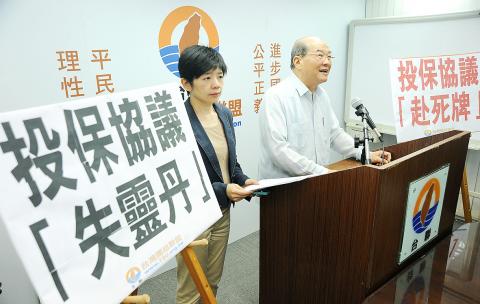The Democratic Progressive Party (DPP) and the Taiwan Solidarity Union (TSU) yesterday blasted the freshly signed cross-strait agreement on investment protection and promotion, saying Taiwan has suffered a humiliating defeat in the negotiations.
Both opposition parties called press conferences yesterday afternoon right after the signing of the cross-strait agreement.
“The agreement was worse than a ‘knockoff agreement’ as it failed to address Taiwanese people’s needs and expectations,” the DPP’s Policy Research Committee Executive Director Joseph Wu (吳釗燮) and China Affairs Department Director Honigmann Hong (洪財隆) told a press conference.

Photo: Liu Hsin-de, Taipei Times
Beijing did not make concessions on most of the major issues, such as arbitration in a third country and the protection of basic human rights, Wu said.
In particular, Wu added, protection of Taiwanese businesspeople’s personal safety was only included as an appendix and its content lacks reciprocity.
Taiwan did not get the international arbitration it wanted in the negotiation, he said, adding the arbitration mechanism was viewed as a “domestic issue” which would make Taiwan a de facto Chinese colony.”
The DPP demanded that the agreement be monitored and amended by the Legislative Yuan, Wu said.
The government should also review all cases of Taiwanese investment victims in China and set a timetable for Beijing to resolve those cases, Wu said.
“Otherwise, this agreement should not be called the investment protection agreement,” he said.
“Taiwan failed to get everything it expected to get, while China got everything it wanted,” Hong summed up the negotiations.
Hong warned that China could use the agreement to demand that Taiwan open up further to Chinese investments.
There are at least four major flaws in the agreement, TSU Chairman Huang Kun-huei (黃昆輝) told a separate press conference yesterday afternoon.
A 24-hour notification clause would not stop China from detaining Taiwanese businesspeople and the inclusion of a national treatment principle and Most Favored Nation treatment would pave the way for a Chinese-investment influx, Huang said.
The agreement would likely decriminalize Chinese actions by turning a large number of cases of illegal seizures of Taiwanese businesspeople’s assets into investment disputes, Huang said.
While the agreement allows person-to-person disputes to be arbitrated in a third country, he added, those disputes could not be arbitrated without mutual consent, making it a “nominal” agreement.
As the 16 agreements signed with China in the past had not been effectively implemented, there would be no reason to believe that the two agreements signed yesterday would be enforced, Huang said.
Meanwhile, the Cross-Strait Agreement Watch Alliance yesterday gave a low grade of 27 points to the signed cross-strait investment protection agreement, saying that it failed to respond to demands from the public.
“The agreement is really disappointing. It made no breakthroughs and is only maintaining the ‘status quo,’” Cross-Strait Agreements Watch convener Lai Chung-chiang (賴中強) said. “It contains no third-party arbitration measures for trade disputes, which exist in most international trade agreements.”
“There’s also no requirement for China to notify businesspeople’s families in Taiwan when Taiwanese nationals are detained in China,” he added.
Lai said the agreement is “surprisingly regrettable.”
A Taiwan Labor Front supervisory board member, Chang Feng-yi (張烽益), panned the agreement for not having any clause protecting workers’ rights.
“In most trade agreements — including the one that Taiwan signed with Japan — there are clauses prohibiting both parties to stimulate investments by lowering labor standards,” Chang said. “It’s regrettable that there’s no such requirement in the cross-strait trade agreement.”

Taiwan is stepping up plans to create self-sufficient supply chains for combat drones and increase foreign orders from the US to counter China’s numerical superiority, a defense official said on Saturday. Commenting on condition of anonymity, the official said the nation’s armed forces are in agreement with US Admiral Samuel Paparo’s assessment that Taiwan’s military must be prepared to turn the nation’s waters into a “hellscape” for the Chinese People’s Liberation Army (PLA). Paparo, the commander of the US Indo-Pacific Command, reiterated the concept during a Congressional hearing in Washington on Wednesday. He first coined the term in a security conference last

Prosecutors today declined to say who was questioned regarding alleged forgery on petitions to recall Democratic Progressive Party (DPP) legislators, after Chinese-language media earlier reported that members of the Chinese Nationalist Party (KMT) Youth League were brought in for questioning. The Ministry of Justice Investigation Bureau confirmed that two people had been questioned, but did not disclose any further information about the ongoing investigation. KMT Youth League members Lee Hsiao-liang (李孝亮) and Liu Szu-yin (劉思吟) — who are leading the effort to recall DPP caucus chief executive Rosalia Wu (吳思瑤) and Legislator Wu Pei-yi (吳沛憶) — both posted on Facebook saying: “I

The Ministry of Economic Affairs has fined Taobao NT$1.2 million (US$36,912) for advertisements that exceed its approved business scope, requiring the Chinese e-commerce platform to make corrections in the first half of this year or its license may be revoked. Lawmakers have called for stricter enforcement of Chinese e-commerce platforms and measures to prevent China from laundering its goods through Taiwan in response to US President Donald Trump’s heavy tariffs on China. The Legislative Yuan’s Finance Committee met today to discuss policies to prevent China from dumping goods in Taiwan, inviting government agencies to report. Democratic Progressive Party Legislator Kuo Kuo-wen (郭國文) said

The Ministry of Economic Affairs has fined Taobao NT$1.2 million (US$36,900) for advertisements that exceeded its approved business scope and ordered the Chinese e-commerce platform to make corrections in the first half of this year or its license would be revoked. Lawmakers have called for stricter supervision of Chinese e-commerce platforms and more stringent measures to prevent China from laundering its goods through Taiwan as US President Donald Trump’s administration cracks down on origin laundering. The legislature’s Finance Committee yesterday met to discuss policies to prevent China from dumping goods in Taiwan, inviting government agencies to report on the matter. Democratic Progressive Party